Media release – Enterprise Marketing & Research Services, 28 February 2024
Minor Parties and Independents Poised to Wield Considerable Influence in March Election
The latest EMRS poll of 1,000 Tasmanian voters was conducted from the 15th to the 21st February 2024. After excluding undecided voters, support for the Liberal Government currently stands at 39 per cent, unchanged from the result recorded in the previous November 2023 poll. This marks a 10-point decrease for the Government from the May 2021 election.
The Labor opposition saw a further drop in support among decided voters of 3-points to 26 per cent, widening the gap between the two major parties to 13 percentage points, the largest since December 2021. Regardless of this gap, Labor has not experienced the same level of decline in support as the Liberal State Government since the last election
Support for the Greens remained consistent with the November 2023 poll, positioning them at a similar level to the last election.
The decline in support for Labor coincides with the Jacqui Lambie Network (JLN) announcing their candidacy in four of the five electorates (excluding Clark). Decided voter support for the JLN sits at 9 per cent, and in combination with the ongoing strong support for Independent candidates (up 8-pts from May 2021), minor parties and independents appear to hold significant influence in shaping the outcome of the March Election.
Paul Jamrozik (EMRS’ Managing Director) said, “the Labor opposition has seen a steady decline in voter support since August 2023, partly attributed to the Jacqui Lambie Network’s candidacy in four out of the five electorates. This is an indication that voters are not convinced that Labor is a viable alternative government. Meanwhile, the Liberal Government has not yet seen the JLN impact on voter support in the latest poll; however, it would appear that the Liberal vote has been eroded in favour of independent candidates since the last election.”
When it comes to preferred premier, Jeremy Rockliff for the Liberals remains stable at 41 per cent, while Labor’s Rebecca White has narrowed the gap, rising from 35 per cent in November 2023 to 38 per cent in the February poll. The rise in support for White is due to an increase in voters making a decision between the two major party leaders, with a decrease in undecided voters from 23 per cent in November 2023 to 20% in February 2024.
Health and the cost of living continue to be major concerns overall, with health a particularly strong concern for those living in the electorate of Lyons, which is not unexpected given its rurality. Among voters showing a preference for the Liberal Government, health and cost of living are given equal billing, while Labor and JLN supporters are more concerned with healthcare issues. Females are more likely to stress health as an issue than males, while younger voters aged 18 to 34 years are more likely to cite cost of living pressures as a key issue for them.
Editor’s note: there are more insights to be had at the EMRS voting intentions dashboard, Voting intentions dashboard — emrs.
“The EMRS live dashboard gives you direct, interactive access to our quarterly research on Tasmanian voting intentions.”

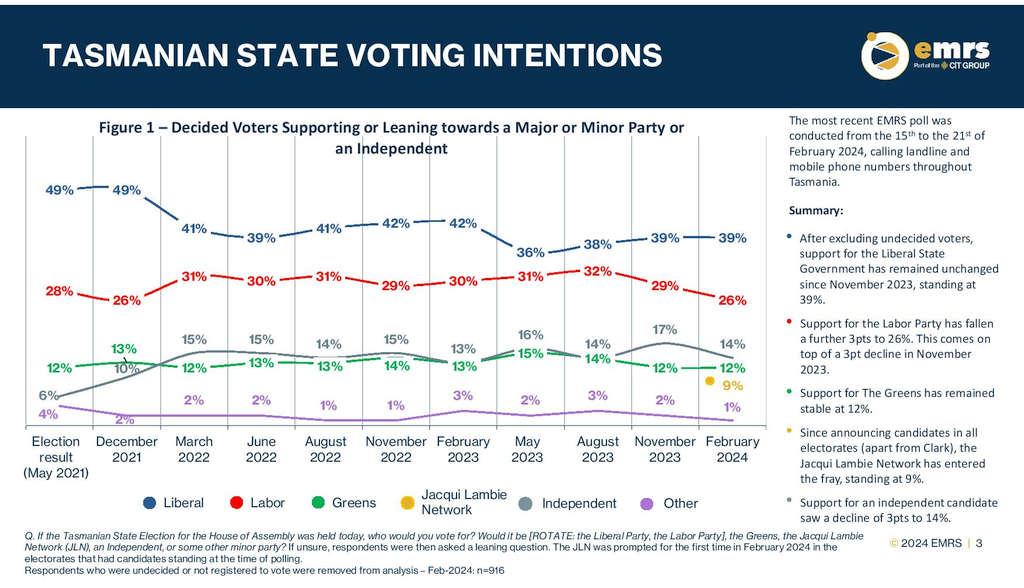
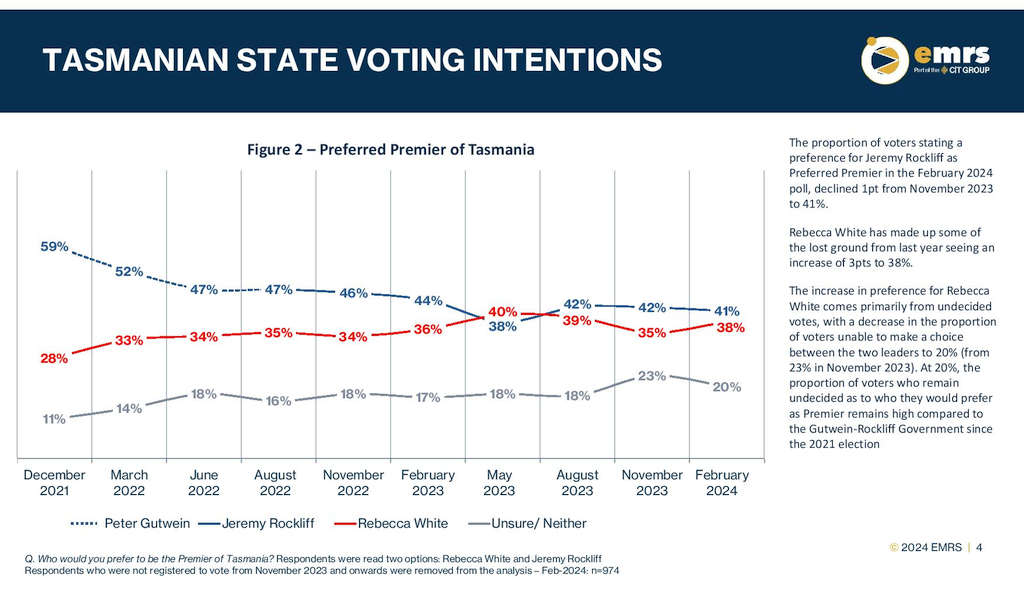




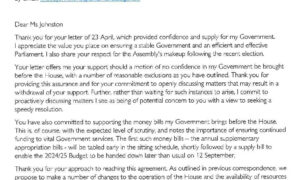




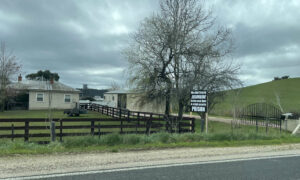













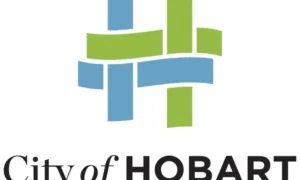







Ted Mead
February 28, 2024 at 14:38
It’s now quite predictable that voters are now looking beyond the stale and vapid 3-Party presence in Tasmania.
The EMRS poll clearly indicates the ALP wheels are continuing to fall off, yet somehow Ms White’s premier preference has risen slightly in the last 15 months, though not quite a surge as Tasmanian Times has stated! I suspect the ALP support will decline even further in the next few weeks as traditional votes leak to the Jacquie Lambie Network!
For the Greens, this poll must be a crisis statement. Their new leadership has failed to inspire any increase in popularity, and the illusion of them having the balance of power is well beyond a pipe dream now! In my view the Greens are now an ineffective reactionary party rather than a proactive party. Their environmental conservation policies have been lame and unconvincing for the last 15 years, and they have essentially lost notably from that supporter base!
Here’s my pre-election guesstimate for the future minority government MHAs …
Jacquie Lambie Network – Bass, Braddon and maybe Lyons
Greens – Franklin, Clarke and maybe Braddon
David O’Byrne
Kristie Johnston
Sue Hickey
John Tucker
.. and either Jack Davenport or Lara Alexander in Bass.
Aaron de Wit
February 28, 2024 at 14:40
It’s a disaster poll for Labor. They look cooked.
Geoff Holloway
February 28, 2024 at 15:10
Note:
(1) The Tasmania-wide 12% vote for the Greens has to be broken down as most of that vote is in Clark and Franklin, meaning that the Greens are not likely to be elected in Lyons, Braddon or Bass. In Bass there is an ex-Greens independent who polled well in 2021.
(2) the Liberals are likely to be re-elected as the government – as has been predicted by the bookies.
(3) No independents will be elected unless there is a methodological issue with the sample survey. EMRS does not publish its full methodology.
(4) I feel that the most likely seat for the Jacquie Lambie Network to win is in Lyons.
Chief Editor TT
February 28, 2024 at 18:50
As Kevin Bonham has noted in his blog, there are even smaller parties like SFF, AJP, Local Network that will not get a seat anywhere but will probably chip about 3% off that ‘independent’ figure. Where preferences go is anyone’s guess given they are not running large tickets.
https://kevinbonham.blogspot.com/2024/02/emrs-liberals-have-big-lead-but-still.html
James
February 28, 2024 at 19:17
It astonishes me that EMRS and other “experts” are making predictions on a phone poll result that is quite flimsy and unreliable. 1,000 voters might have been a useful number in the past, but realistically we are in uncharted waters! The two-party system is on the nose!
Having experienced the methodology used in EMRS polls in the past as a participant, I observed that their questions are often “forced choice” and are using arguably “poor” methodology. They often ask the question “If you had to vote for Labor or Liberal, who would you choose?” Many undecided people hang up at this point, or “game the pollster” with no reliable answer.
The sample is unlikely to be representative in this age of disappearing landlines. They often use the same participants (hence similar results) simply because they get paid to produce a result, however flimsy. Statements by the pollster such as “This is an indication that voters are not convinced that Labor is a viable alternative government” could be argued as biased, or speculative at best. I will chuckle when this “push poll” is shown for what it is on election day!
The political landscape has changed, and so it’s time for better methods!
Will Murray
February 29, 2024 at 07:01
Like all the big pollsters, EMRS used a combination of landline / mobile for this poll. They were also polling voting intentions last week via an online panel.
The panel is moderated for various demographics and geography, for example, you might be a 60-year-old male in postcode 7250, and when you go to complete the poll it might respond, after the age and postcode question, that it has enough respondent samples in that category. The question asked is very simple, namely “For whom do you intend to vote, with choices being Liberal, Labor, The Greens, The Jacquie Lambert Network, or independent? It is not a push poll.
Ron Moore
March 24, 2024 at 13:56
Phew! That election result was really close!
For a while there I feared Tasmanians might lurch forward into the 15th century.